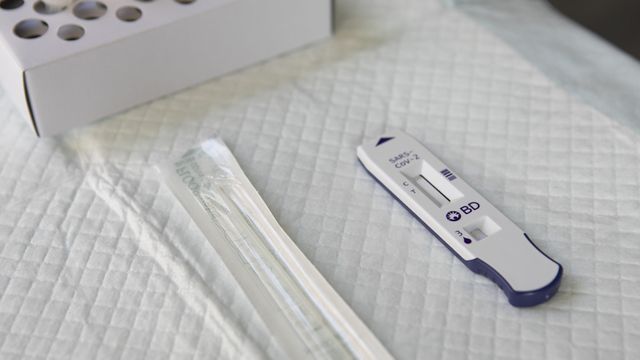Rapid coronavirus tests available to NC school districts
North Carolina school districts can now apply for a pilot program for rapid antigen testing for coronavirus, officials said Thursday.
The state isn't requiring schools to test students or staff, but districts that want to can sign up for the new program in partnership with local health officials. Testing would target either symptomatic students and staff or those who are close contacts of someone who has tested positive for the virus.
By the end of the month, North Carolina will have received more than 3 million rapid antigen tests from the federal government. K-12 students are one of the groups the state has prioritized to get them.
Antigen tests aren't as accurate as the more commonly used molecular lab tests, but they can give results within minutes or hours – rather than days – and they're much cheaper than lab testing.
Also, the tests can be done by anyone who's gone through the required training. They don't have to be given by a health care professional.
State Health Director Dr. Betsy Tilson told the State Board of Education that there's been a surprising level of interest from districts wanting to be part of the pilot.
"The point about rapid testing will be early identification of people who may be positive so that we can more quickly put in place those control measures to prevent spread through the schools," Tilson said.
To qualify, schools have to be holding in-person classes and have a plan to get parental permission before testing and to notify parents of the results.
Tilson said state officials hope to get the first round of rapid antigen tests out to the pilot sites in less than two weeks. The program could then expand to more districts next year if the federal government sends additional supplies, she said.
Tilson also told the state board about plans for rolling out coronavirus vaccines once they're approved.
Classroom teachers who have two or more risk factors for COVID-19 will be in the later phases of the first group to be eligible for vaccination, she said.
Other teachers will be in Phase 2 of the rollout, as they're considered frontline essential workers.
But school-aged children most likely won't get vaccinated until later in 2021 because no vaccine studies have looked at safety and efficacy in children under age 12.
Some trials are starting to look at how well the vaccines work for teenagers, Tilson said.
"We will not have data on children," she said. "So, we’ll probably have to hold off on vaccinating children until we have the data or recommendations."
If everything goes smoothly, including all of the required U.S. Food and Drug Administration approvals, the state could start receiving the first shipments of the Moderna vaccine a week or so after the Pfizer vaccine arrives this month, she said.










